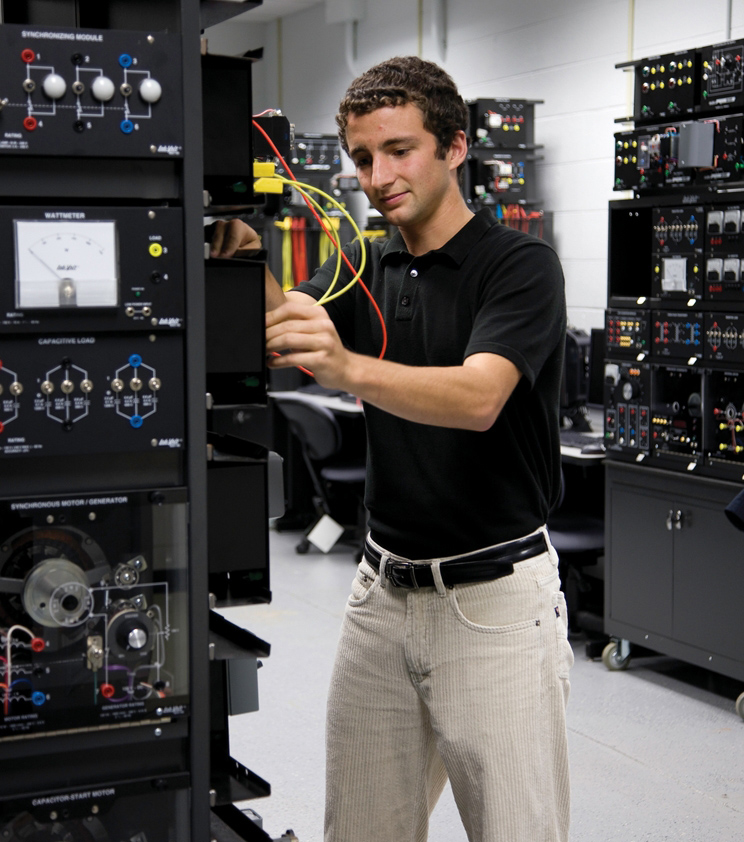May 2, 2012 — Greg Troyer will receive his bachelor of science degree in engineering science from the University of Virginia on May 20, having spent the vast majority of his academic time away from Grounds.
He's among the first graduates of Engineers PRODUCED in Virginia, an innovative workforce development program that brings engineering education out to students in Virginia communities needing greater access to technical talent.
After he completes his degree, Troyer will work full-time for Areva, a global energy company in Lynchburg, where he will evaluate and analyze the materials used in nuclear power plants. A Lynchburg native, he has spent summers interning at Areva and worked part-time there while finishing his degree.
Graduating from U.Va. with a 4.0 grade-point average, he has received the Materials Science and Engineering Distinguished Undergraduate Award.
Troyer, 24, said he was working in construction, but knew that wasn't a long-term proposition. "I've always been interested in math and science, which fall together into engineering as a practical application," he said.
While a student at Central Virginia Community College, he became acquainted with the PRODUCED program and, after earning his associate's degree with a 4.0 GPA, enrolled at U.Va.
"All of my classes have been taken electronically," he said. "Online learning sounds terrible to some people, but when we're taking classes at U.Va., we're sitting in on real, live classes. There's a professor lecturing to 30 or 100 students and we have video feed into the classroom, desktop sharing so I can see the PowerPoint the class sees, and two-way audio so I can ask a question in real time.
"All I need is a reliable Internet connection. I take classes from my desk at work, or from my desk at home. I prefer this type of setting and the flexibility it gives me."
Working part-time while attending U.Va. was a good combination for him, he said. "From a professional development standpoint, I learn just as much or more from being at work as I do at school," he said. "This benefits me because I can ask informed questions in the classroom to help cement something I see at work. It is also beneficial to U.Va. because I'm in the classroom making the professor think about how what they are teaching is being applied in real life."
Some of his more challenging courses were those examining the social implications of engineering. "The topics we consider are personally stretching, such as, 'How do the decisions I make as an engineer impact society? How does the globalization of an engineering workforce affect me? The country?' "
Real-life nuclear engineering experience came in the form of the 2011 earthquake and tsunami in Japan, which damaged a nuclear power plant. The event had an impact on class discussions, Troyer said.
"To me, the tsunami and earthquake demonstrated that if our oldest designs can take a tsunami and earthquake and come away with no loss of life, maybe we're on to something," he said.
Thirty German students were taking part in the course at the time, he recounted. "Shortly after the events in Japan, Germany announced its plans to shut down its nuclear reactors," Troyer said. "We had a three-week long debate in class over nuclear energy. At the end of the debate, the majority of German students came to the conclusion that Germany should not shut down its nuclear power plants. This was a demonstration of the importance of educating all people on all of the different options so people themselves can make informed decisions."
Troyer said he's excited to be working in the energy industry. "Energy is critical to society. To be a part of a large international organization that supports energy development is appealing."
As a materials engineer, he will be examining what happens as a system's components age. "Most of my work is tied to analytical work, predictions of how materials will degrade over time," he said.
The labor picture for nuclear engineers is pretty bright, Troyer said, encouraging others to give it some consideration.
"The nuclear energy industry is going to continue to need people in its workforce," he said. "I must be about the youngest guy here – many people I work with are close to retirement age. Even if new plants end up not coming online, life extension for our operating fleet is happening now, and who knows, maybe there will be another round of extensions down the road, too.
With the potential for new plants, the workforce will need to increase even more."
– Adapted from Career Currents, a publication of the National Energy Education Development Project
Media Contact
Article Information
May 2, 2012
/content/class-2012-produced-graduate-greg-troyer-technically-employed

